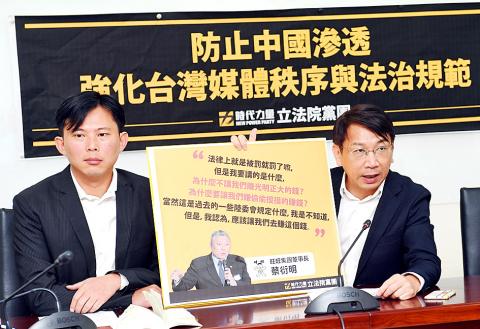The New Power Party (NPP) yesterday proposed amendments that would subject Taiwanese who lobby for Chinese political interests to prison sentences of up to three years and fines of NT$500,000 to NT$5 million (US$15,893 to US$158,932).
Under the drafts to the Act Governing Relations Between the People of the Taiwan Area and the Mainland Area (臺灣地區與大陸地區人民關係條例), Taiwanese individuals and organizations would be banned from lobbying for the political interests of the Chinese government, political parties or organizations that might affect Taiwan’s national security or interests, NPP Legislator Huang Kuo-chang (黃國昌) told a news conference.
While the 2007 Lobbying Act (遊說法) already bans Chinese individuals and organizations from lobbying for their political interests or having others lobby on their behalf, the provision does not entail any punishment and is “almost useless,” Huang said.

Photo: CNA
While a number of officials have advocated the introduction of a law similar to the US’ Foreign Agents Registration Act, mere transparency would not be sufficient for Taiwan, he said.
The US act, passed in 1938, requires individuals and organizations controlled by foreign governments or organizations to disclose such connections, as well as information about their activities and finances, Huang added.
The drafts are part of a series of amendments proposed by the NPP to enhance protection of the nation’s democracy and security against Chinese infiltration, NPP caucus convener Hsu Yung-ming (徐永明) said.
The party has also proposed amendments to broadcasting laws and the National Security Act (國家安全法) to tighten regulations on media companies controlled by the Chinese government or organizations, and on publishing Chinese Communist Party propaganda, he added.
As many bills are still under review with the legislative session expected to end in a few weeks, Hsu said that he hopes Legislative Speaker Su Jia-chyuan (蘇嘉全) would extend the session to allow more time for discussion.
“In her speech [on Monday] to mark her inauguration anniversary, President Tsai Ing-wen (蔡英文) listed protecting Taiwan’s sovereignty as one of her major achievements,” he said.
Since all three draft amendments are in line with that goal, they should receive support from legislators across party lines and pass soon, Hsu added.

MORE VISITORS: The Tourism Administration said that it is seeing positive prospects in its efforts to expand the tourism market in North America and Europe Taiwan has been ranked as the cheapest place in the world to travel to this year, based on a list recommended by NerdWallet. The San Francisco-based personal finance company said that Taiwan topped the list of 16 nations it chose for budget travelers because US tourists do not need visas and travelers can easily have a good meal for less than US$10. A bus ride in Taipei costs just under US$0.50, while subway rides start at US$0.60, the firm said, adding that public transportation in Taiwan is easy to navigate. The firm also called Taiwan a “food lover’s paradise,” citing inexpensive breakfast stalls

TRADE: A mandatory declaration of origin for manufactured goods bound for the US is to take effect on May 7 to block China from exploiting Taiwan’s trade channels All products manufactured in Taiwan and exported to the US must include a signed declaration of origin starting on May 7, the Bureau of Foreign Trade announced yesterday. US President Donald Trump on April 2 imposed a 32 percent tariff on imports from Taiwan, but one week later announced a 90-day pause on its implementation. However, a universal 10 percent tariff was immediately applied to most imports from around the world. On April 12, the Trump administration further exempted computers, smartphones and semiconductors from the new tariffs. In response, President William Lai’s (賴清德) administration has introduced a series of countermeasures to support affected

CROSS-STRAIT: The vast majority of Taiwanese support maintaining the ‘status quo,’ while concern is rising about Beijing’s influence operations More than eight out of 10 Taiwanese reject Beijing’s “one country, two systems” framework for cross-strait relations, according to a survey released by the Mainland Affairs Council (MAC) on Thursday. The MAC’s latest quarterly survey found that 84.4 percent of respondents opposed Beijing’s “one country, two systems” formula for handling cross-strait relations — a figure consistent with past polling. Over the past three years, opposition to the framework has remained high, ranging from a low of 83.6 percent in April 2023 to a peak of 89.6 percent in April last year. In the most recent poll, 82.5 percent also rejected China’s

PLUGGING HOLES: The amendments would bring the legislation in line with systems found in other countries such as Japan and the US, Legislator Chen Kuan-ting said Democratic Progressive Party (DPP) Legislator Chen Kuan-ting (陳冠廷) has proposed amending national security legislation amid a spate of espionage cases. Potential gaps in security vetting procedures for personnel with access to sensitive information prompted him to propose the amendments, which would introduce changes to Article 14 of the Classified National Security Information Protection Act (國家機密保護法), Chen said yesterday. The proposal, which aims to enhance interagency vetting procedures and reduce the risk of classified information leaks, would establish a comprehensive security clearance system in Taiwan, he said. The amendment would require character and loyalty checks for civil servants and intelligence personnel prior to